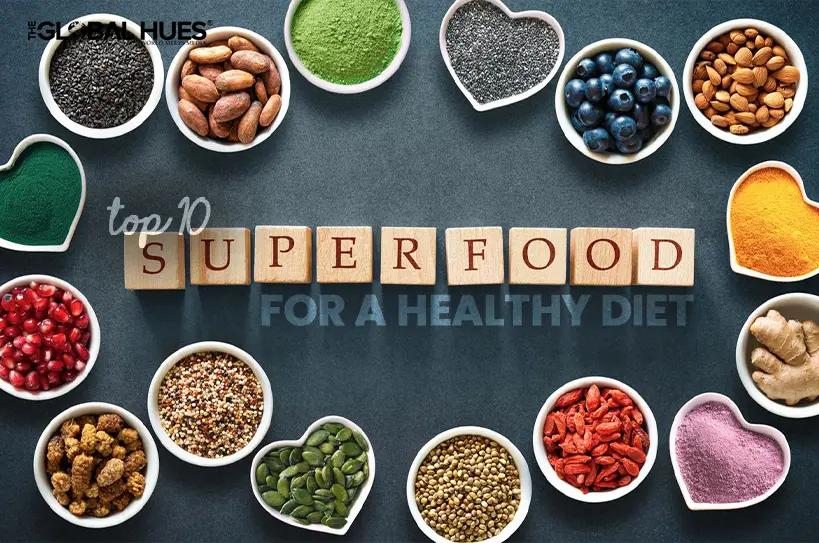A well-balanced diet is crucial when it comes to maintaining good health, preventing diseases, and sustaining energy levels. Superfoods are nutrient-rich foods that are packed with Vitamins, Minerals, and Antioxidants which assist in various bodily functions. Incorporating these foods in your diet can improve immune health, enhance brain functioning, promote heart health, and improve digestion. Here are the top 10 superfoods you should include in your diet for long-term health benefits.
1. Blueberries
Blueberries are some of the most nutritious foods one can consume. They are rich in vitamin C, fiber, and flavonoids and are also antioxidant powerhouses. Blueberries help reduce inflammation, improve brain function, and support heart health.
Health Benefits:
- Protects against oxidative stress.
- Improves memory and cognitive function.
- Supports heart health by lowering blood pressure.
- Aids digestion with its fiber content.
How to Eat:
- Add to smoothies, yogurt, or oatmeal.
- Eat fresh as a snack.
- Use in healthy desserts.
2. Leafy Greens
Leafy greens such as kale, spinach, Swiss chard, and many others are crammed with fiber, vitamins A, C and K, calcium, and iron. They assist in lowering inflammation and promoting eye and bone health.
Health Benefits:
- Boosts immunity with vitamin C.
- Supports bone strength with calcium and vitamin K.
- Enhances eye health with beta-carotene.
- Aids digestion and promotes gut health.
How to Eat:
- Blend into smoothies.
- Add to soups, salads, and stir-fries.
- Sauté with olive oil and garlic for a quick side dish.
Must Read: Top 10 Herbal Teas for Detoxification
3. Nuts and Seeds
Nuts and seeds – almonds, walnuts, chia seeds, flaxseeds, and more – have healthy fats, protein, and fibers. Excellent for heart and brain health along with managing weight.
Health Benefits:
- Reduces cholesterol levels and supports heart health.
- Provides omega-3 fatty acids that boost brain function.
- Keeps you full longer, aiding in weight control.
- Supports digestion and gut health.
How to Eat:
- Sprinkle on yogurt or oatmeal.
- Blend into smoothies.
- Eat raw as a snack.
4. Cruciferous Vegetables
Contains fiber, Vitamin C, and antioxidants that help fight cancer. This family includes broccoli, brussels sprouts and cauliflowers.
Health Benefits:
- Helps detoxify the body.
- May reduce cancer risk with antioxidants.
- Supports gut health with fiber.
- Enhances immune function.
How to Eat:
- Roast or steam as a side dish.
- Blend into soups.
- Add to stir-fries and salads.
5. Avocados
Rich in fiber, potassium, and monounsaturated fats, avocados are nutrient-dense fruits. They support digestion, heart health, and reduce inflammation.
Health Benefits:
- Supports heart health by improving cholesterol levels.
- Provides healthy fats for brain function.
- Helps digestion with its fiber content.
- Reduces inflammation in the body.
How to Eat:
- Mash on toast with eggs.
- Blend into smoothies.
- Add to salads and sandwiches.
6. Salmon
Salmon is an abundant source of omega-3 fatty acids, high-quality protein, and important vitamins. It promotes brain function, heart, and muscle growth.
Health Benefits:
- Reduces inflammation with omega-3s.
- Supports brain and cognitive function.
- Lowers the risk of heart disease.
- Provides high-quality protein for muscle repair.
How to Eat:
- Grill or bake as a main dish.
- Add to salads or grain bowls.
- Use in sushi or poke bowls.
7. Greek Yogurt
With high amounts of calcium, probiotics, and protein, greek yogurt aids gut health, bone strength, and muscle recovery.
Health Benefits:
- Promotes healthy digestion with probiotics.
- Strengthens bones with calcium.
- Supports muscle repair with protein.
- Helps with weight management by keeping you full longer.
How to Eat:
- Enjoy as a snack with fruit and honey.
- Blend into smoothies.
- Use as a base for salad dressings.
8. Quinoa
Quinoa contains gluten free whole grains, packed with protein, fiber, and amino acids. It can be substituted for rice and offers support in energy levels and digestion.
Health Benefits:
- Provides plant-based protein for muscle growth.
- Aids digestion with fiber.
- Keeps energy levels stable.
- Helps with weight management.
How to Eat:
- Use as a base for grain bowls.
- Mix with vegetables and olive oil for a salad.
- Cook as a side dish with protein.
9. Turmeric
Turmeric is a spice that contains curcumin, whose anti-inflammatory properties aids in joint health, brain function, and immune support.
Health Benefits:
- Reduces inflammation and joint pain.
- Supports brain health and may lower the risk of neurodegenerative diseases.
- Boosts immunity.
- Aids digestion.
How to Eat:
- Add to soups, curries, and rice dishes.
- Mix with warm milk for a turmeric latte.
- Sprinkle onto roasted vegetables.
10. Dark Chocolate
Dark chocolate supports heart health, boosts mood, reduces stress, and contains a large amount of antioxidants, fiber and iron with 70% cocoa or more.
Health Benefits:
- Protects against oxidative stress.
- Improves blood flow and lowers blood pressure.
- Boosts mood and brain function.
- May reduce the risk of heart disease.
How to Eat:
- Eat a small square as a snack.
- Melt and drizzle over fruit.
- Mix into smoothies or oatmeal.
Conclusion
Including superfoods can enhance heart health, immunity, and brain function. Eating a varied and balanced diet including nutrient and superfood dense salmon, leafy vegetables, nuts, and quinoa greatly improves overall health. For better energy, increased longevity, and reduced risk of diseases, incorporate superfoods into your daily meals.
FAQs
1. What are the top 3 superfoods for overall health?
Blueberries, salmon, and leafy green vegetables, because they have strong anti-oxidants, omega 3 fatty acids, and important vitamins.
2. Can I eat too many superfoods?
Consuming too much may lead to unhealthy results. Moderation is recommended for the best benefits.
3. Which superfoods help with weight loss?
Greek yogurt, quinoa, and nuts keep you full for long periods and help you manage your weight.
4. How often should I eat superfoods?
Mixes of superfoods eaten daily provide long lasting health benefits.
5. Are superfoods suitable for all diets?
Most superfoods comply with many diets, including vegetarian, vegan, gluten free, keto and other lifestyles.
(We’re always open to hearing from our community! If you have any feedback or believe your contributions should be recognized, please get in touch.)




